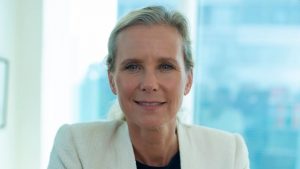https://www.freepressjournal.in/business/the-mood-is-upbeat-with-swedish-companies-in-india
Interview: Anna Lekvall
A flourishing relationship between Sweden and India

Like her predecessors, Anna Lekvall, Consul General of Sweden in Mumbai, plans to continue focussing on business, looking at India-Sweden ties. She believes that the relationship between the two countries has flourished and grown by leaps and bounds, the bond just seems to grow stronger, stated Lekvall in an interview with The Free Press Journal’s Jescilia Karayamparambil and R N Bhaskar.
Edited Excerpts:
How has your experience in India been so far?
It is an exciting time to come to India. It is a fascinating country which is diverse and vast. In case of Mumbai, it is a melting pot. It feels like home already. The picture of India is changing—becoming more dynamic and modern. Not just the growth of the Indian economy, but also the innovation coming out of the country is a great attraction.
Where is your take on India-Sweden relations?
Over the last few years, the level of interest and curiosity about India have been on an upswing, especially from the perspective of Swedish companies. During the last five-six years, relations between both countries have seen a boom. We have seen prime ministers from both countries visiting each other’s countries. Even Swedish King Carl XVI Gustaf and Queen Silvia of Sweden visited India.
During their five-day visit, they also visited Mumbai. This visit was mainly to further strengthen the already well-developed relation. Around 100 Swedish companies— established, big and small— accompanied the King and Queen and these company representatives meet officials in Delhi and Mumbai. We engaged with these Swedish companies that have continued their interest and engagement in doing business with India.
To improve business relations, a lot is being done. In one of our top-executive forums — India-Sweden Business Summit — top businessmen from India and Sweden are seen sharing their knowledge. There are four working groups that are driven by Swedish businessman, Marcus Wallenberg from the Sweden side and Baba Kalyani from the Indian side. (The Wallenberg family controls most of the major companies in Sweden – Editor). These working groups look into the potential for smart cities, skilling, digitalisation and defense in India.
There is the Swedish India Business Council (SIBC) as well, which looks at bringing delegations from Sweden to India and from India to Sweden. There are lots of things that are going on.
More and more Indian companies are also visiting Sweden. There are around 70 Indian companies in Sweden now. Indians form the largest community in Sweden outside of European Union countries, and are getting the largest number of work permits in Sweden.
There is another positive development. During the last ten years, tourism has increased by 500 per cent between both countries. All these activities show that a lot is going on.
Swedish companies have done very well in India. But how do you see things going forward?
We expect the companies to do well going forward. But all this also depends on the business environment. For most Swedish companies, their experiences in India are quite interesting.
Swedish companies have been in India from the turn of the century. Sweden is one of the countries that saw the potential of India and got established in India very early. There have been several waves of engagement by Swedish companies in India. The bedrock for Swedish companies was the allocation of land in Pune for these companies. There is a long-term commitment by these companies to India.
Yet another wave of Swedish companies in India was in the 80s and 90s — with entry of consumer-oriented businesses. Today, companies like Truecaller and Spotify are present in India. Truecaller’s largest customer base comes from India. Many of these companies have invested in India in a big way and they are trying to consolidate their base in India.
According to the Business Climate Survey 2019-2020, 72 per cent of Swedish businesses in India are satisfied and their experience in setting up business in India has improved too. While last year 84 per cent thought it was neutral or easy to set up business in India; this year it has improved to 96 per cent. However, the business climate experience has come down from 71 per cent in 2018-2019 to 53 per cent in 2019-2020. There are some issues that can be resolved but, overall, business is satisfying.
Investment in India has been viewed differently by different companies What is your observations here?
Three out of five Swedish companies present in India plan to reinvest in India.
Over the last year, the business climate in India has worsened, but still it is at a good level, suggests a survey. This does not mean there are no issues or concerns. The survey has pointed out a list of issues and concerns which the businesses find problematic.
Every direct job creates 10 indirect jobs. In case of Swedish companies, there are 200 of them in India which have created 2,00,000 direct and 2.2 million indirect jobs. Most of these companies are into the technology space. So, they create a lot of indirect jobs.
The Sweden Consulate and Swedish companies in India have been involved in many women’s empowerment programmes. Your views?
I am the third consecutive female Consul General in Mumbai. It sends out a certain signal. We are committed to supporting equality throughout our foreign policy as well. We consider this during our trade relations too. Gender equality is a core value on the Swedish side. But at one point of time, Sweden struggled with this as well. Such values do not come on their own. (You have to work to nurture them.) Such values have resulted in women and men sharing more and more of responsibility equally.
In Mumbai, we had organised a photography exhibition on Swedish Dads. The theme of the exhibition was that with more and more women engaging in work, the men in the family are engaging with their children. It is healthy for both sides. For ages, both genders have lived in strict and separated roles. Gender equality is not just personal for me but for the whole country. It is something that I bring with me.
In India, we are promoting the project ‘Kraftsamla’ among Swedish companies based in Maharashtra (half of Swedish companies in India are based in Maharashtra). This programme is mostly about skilling women to join the workforce. This is something that we have been promoting.
In the case of IKEA, their male and female ratio is 50:50. There are other companies like Oriflame which have the same ratio in their workforce.
This year, we did a two-day workshop to encourage young girls to engage in STEM (Science, Technology and Medicine) courses. We were supported by Niti Aayog in India.
Most countries or companies talk about women empowerment but still there are challenges when it comes to equal pay. What is your take here?
n There should be equality in pay as well. If you ask about Sweden’s own experience, there is obviously a lot more to do in this area. Overall, it has clearly improved. Our key challenge lies in higher leadership positions, where there is still inequality in the systems.
Another area Sweden is known for is its commitment to environment?
Like gender, environment is another key area we are concerned about. This was not the case in the past. Sweden was a polluted country in the past and had its fair share of challenges. There was a conscious change taken in the direction.








































COMMENTS